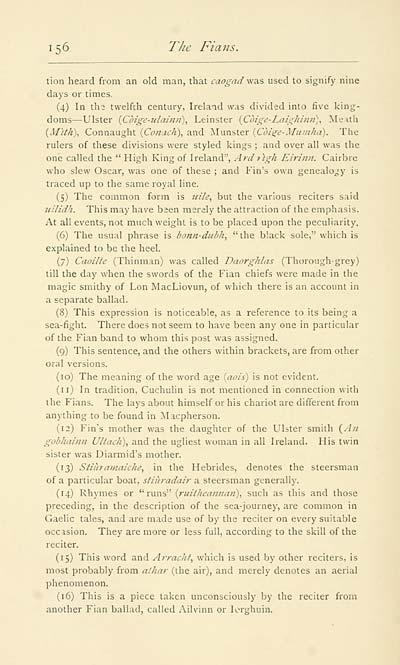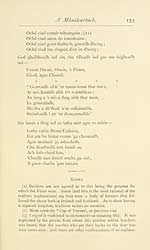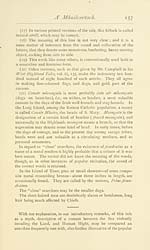Download files
Complete book:
Individual page:
Thumbnail gallery: Grid view | List view

156 The Fians.
tion heard from an old man, that caogad was used to signify nine
days or times,
(4) In th2 twelfth century, Ireland was divided into five king-
doms — Ulster {Coige-tclainn), Leinster {Cbige-Laighinn)^ ]\Ieith
{Mith)^ Connaught {Conach\ and Munster {Cdi^e-Mtiinha). The
rulers of these divisions were styled kings ; and over all was the
one called the " High King of Ireland", Ard figh Eirinn. Cairbre
who slew Oscar, was one of these ; and Fin's own genealogy is
traced up to the same royal line.
(5) The common form is w/7^, but the various reciters said
iiilidh. This may have b3en merely the attraction of the emphasis.
At all events, not much weight is to be placed upon the peculiarity.
(6) The usual phrase is bonn-dubli, "the black sole," which is
explained to be the heel.
(7) Caoilte (Thinman) was called Daorglilas (Thorough- grey)
till the day when the swords of the Fian chiefs were made in the
magic smithy of Lon MacLiovun, of which there is an account in
a separate ballad.
(8) This expression is noticeable, as a reference to its being a
sea-fight. There does not seem to have been any one in particular
of the Fian band to whom this post was assigned.
(9) This sentence, and the others within brackets, are from other
oral versions.
(10) The meaning of the word age {aois) is not evident.
(11) In tradition, Cuchulin is not mentioned in connection with
the Fians. The lays about himself or his chariot are different from
anything to be found in Macpherson.
(12) Fin's mother was the daughter of the Ulster smith (.-///
gobhainn Ulhich), and the ugliest woman in all Ireland. His twin
sister was Diarmid's mother.
(13) Stinramaiche, in the Hebrides, denotes the steersman
of a particular boat, stittradair a steersman generally.
(14) Rhymes or "runs" {ruithea?i!ian), such as this and those
preceding, in the description of the sea-journey, are common in
Gaelic tales, and are made use of by the reciter on every suitable
occasion. They are more or less full, according to the skill of the
reciter.
(15) This word and Arrachf, which is used by other reciters, is
most probably from athar (the air), and merely denotes an aerial
phenomenon.
(16) This is a piece taken unconsciously by the reciter from
another Fian ballad, called Ailvinn or lorghuin.
tion heard from an old man, that caogad was used to signify nine
days or times,
(4) In th2 twelfth century, Ireland was divided into five king-
doms — Ulster {Coige-tclainn), Leinster {Cbige-Laighinn)^ ]\Ieith
{Mith)^ Connaught {Conach\ and Munster {Cdi^e-Mtiinha). The
rulers of these divisions were styled kings ; and over all was the
one called the " High King of Ireland", Ard figh Eirinn. Cairbre
who slew Oscar, was one of these ; and Fin's own genealogy is
traced up to the same royal line.
(5) The common form is w/7^, but the various reciters said
iiilidh. This may have b3en merely the attraction of the emphasis.
At all events, not much weight is to be placed upon the peculiarity.
(6) The usual phrase is bonn-dubli, "the black sole," which is
explained to be the heel.
(7) Caoilte (Thinman) was called Daorglilas (Thorough- grey)
till the day when the swords of the Fian chiefs were made in the
magic smithy of Lon MacLiovun, of which there is an account in
a separate ballad.
(8) This expression is noticeable, as a reference to its being a
sea-fight. There does not seem to have been any one in particular
of the Fian band to whom this post was assigned.
(9) This sentence, and the others within brackets, are from other
oral versions.
(10) The meaning of the word age {aois) is not evident.
(11) In tradition, Cuchulin is not mentioned in connection with
the Fians. The lays about himself or his chariot are different from
anything to be found in Macpherson.
(12) Fin's mother was the daughter of the Ulster smith (.-///
gobhainn Ulhich), and the ugliest woman in all Ireland. His twin
sister was Diarmid's mother.
(13) Stinramaiche, in the Hebrides, denotes the steersman
of a particular boat, stittradair a steersman generally.
(14) Rhymes or "runs" {ruithea?i!ian), such as this and those
preceding, in the description of the sea-journey, are common in
Gaelic tales, and are made use of by the reciter on every suitable
occasion. They are more or less full, according to the skill of the
reciter.
(15) This word and Arrachf, which is used by other reciters, is
most probably from athar (the air), and merely denotes an aerial
phenomenon.
(16) This is a piece taken unconsciously by the reciter from
another Fian ballad, called Ailvinn or lorghuin.
Set display mode to: Large image | Transcription
Images and transcriptions on this page, including medium image downloads, may be used under the Creative Commons Attribution 4.0 International Licence unless otherwise stated. ![]()
| Early Gaelic Book Collections > Ossian Collection > Waifs and strays of Celtic tradition > Volume 4 > (204) |
|---|
| Permanent URL | https://digital.nls.uk/82448376 |
|---|
| Description | IV. The Fians, Gaelic & English. |
|---|---|
| Shelfmark | Oss.279 |
| Attribution and copyright: |
|
| Description | Selected books from the Ossian Collection of 327 volumes, originally assembled by J. Norman Methven of Perth. Different editions and translations of James MacPherson's epic poem 'Ossian', some with a map of the 'Kingdom of Connor'. Also secondary material relating to Ossianic poetry and the Ossian controversy. |
|---|
| Description | Selected items from five 'Special and Named Printed Collections'. Includes books in Gaelic and other Celtic languages, works about the Gaels, their languages, literature, culture and history. |
|---|

